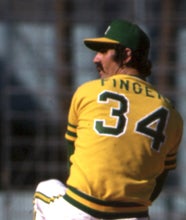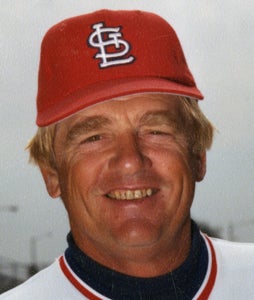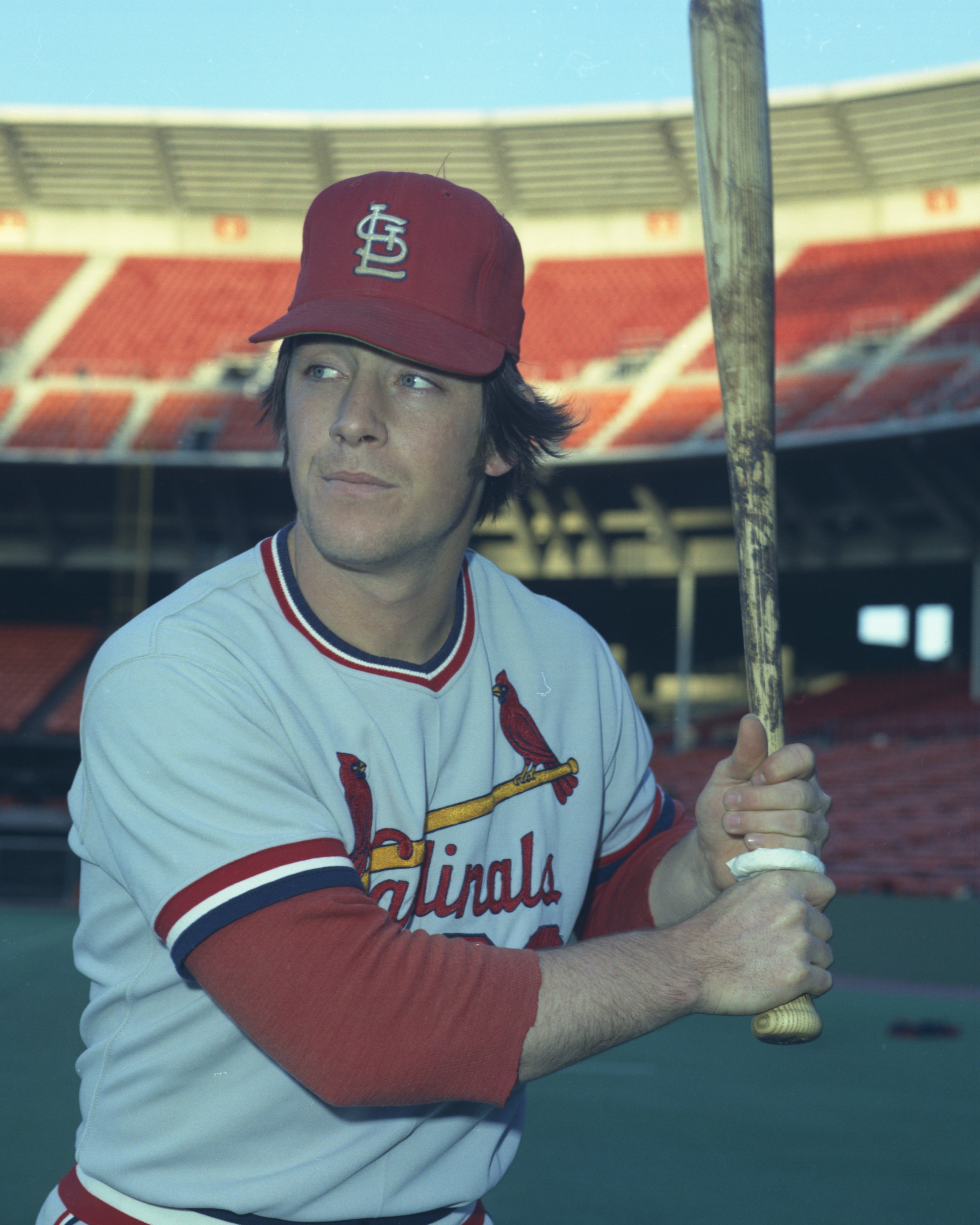- Home
- Our Stories
- #CardCorner: 1986 Donruss Pete Vuckovich
#CardCorner: 1986 Donruss Pete Vuckovich
Since Cy Young Award voting began in 1956, only three pitchers have taken home the hardware and yet never had the honor of an All-Star Game selection.
One of those was Pete Vuckovich, whose peak with the Brewers coincided with the franchise’s first trip to the World Series.
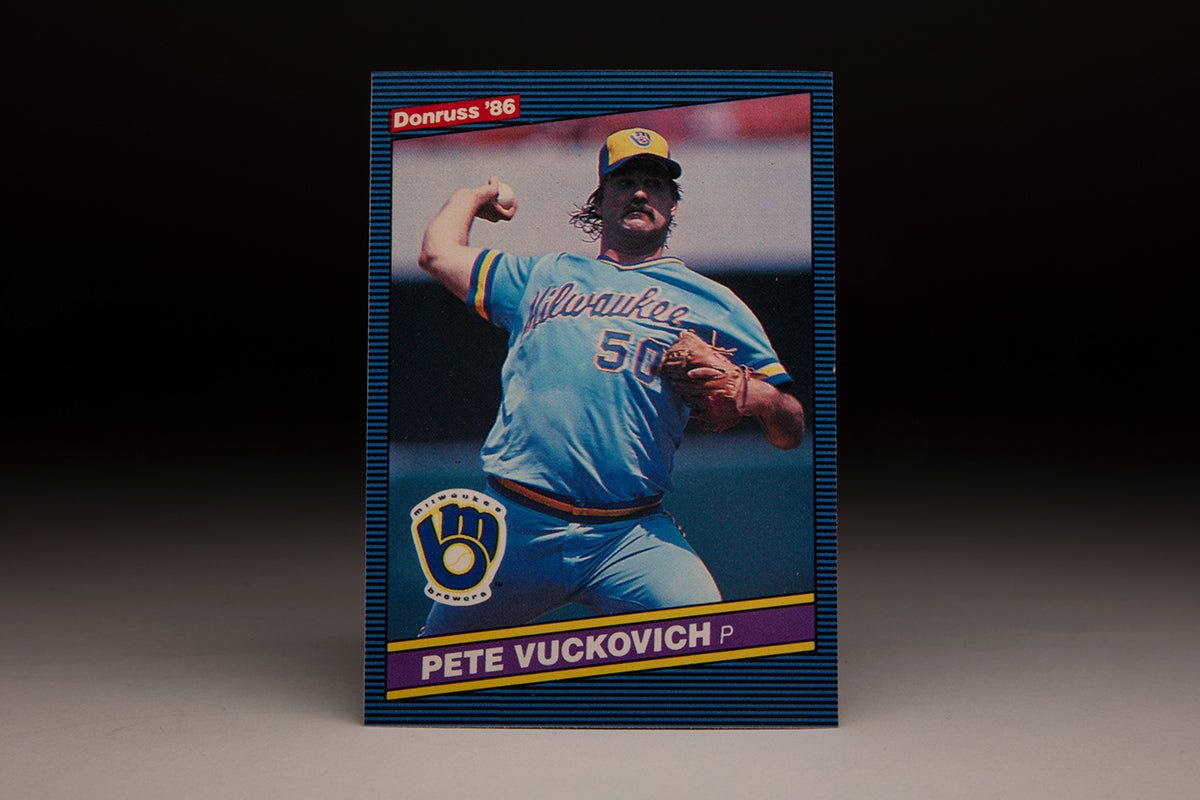
Born Oct. 27, 1952, in Johnstown, Pa., Vuckovich was a first-generation born American whose immigrant father worked in the steel mills after coming to America from Serbia. The only son in a family with five older sisters, Vuckovich was a three-sport athlete at Conemaugh Valley High School where he excelled in football, basketball and baseball. He turned down several gridiron scholarship offers and enrolled at Clarion University, located about a two-hour drive northwest of Johnstown.
“I didn’t make it academically because I didn’t hit the books enough,” Vuckovich told the St. Louis Post-Dispatch. “I was having too much fun and I had my mind too much on baseball.”
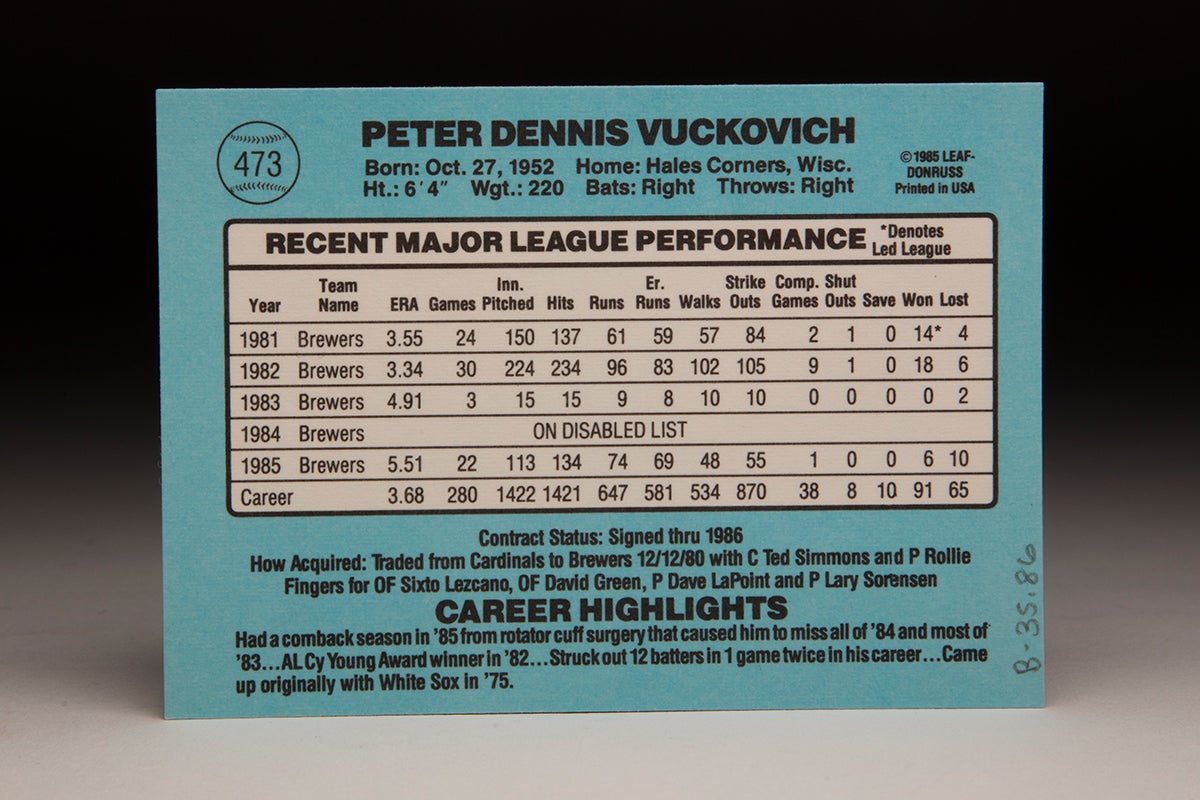
After dominating batters at Clarion, Vuckovich was selected by the White Sox in the third round of the 1974 MLB Draft and sent to Appleton of the Class A Midwest League. After going 1-0 with three saves and a 1.20 ERA in five games, Vuckovich was promoted to Double-A Knoxville.
In 1975, Vuckovich was invited to the White Sox’s Spring Training camp – where he impressed manager Chuck Tanner with his willingness to pitch inside. At 6-foot-4 and 215 pounds, Vuckovich was one of the bigger pitchers of his era and carried a hard edge that was nurtured in his steel town youth.
“They pay me to win,” Vuckovich told the Boston Globe during the peak of his career. “So I do everything I can do to win, period.”
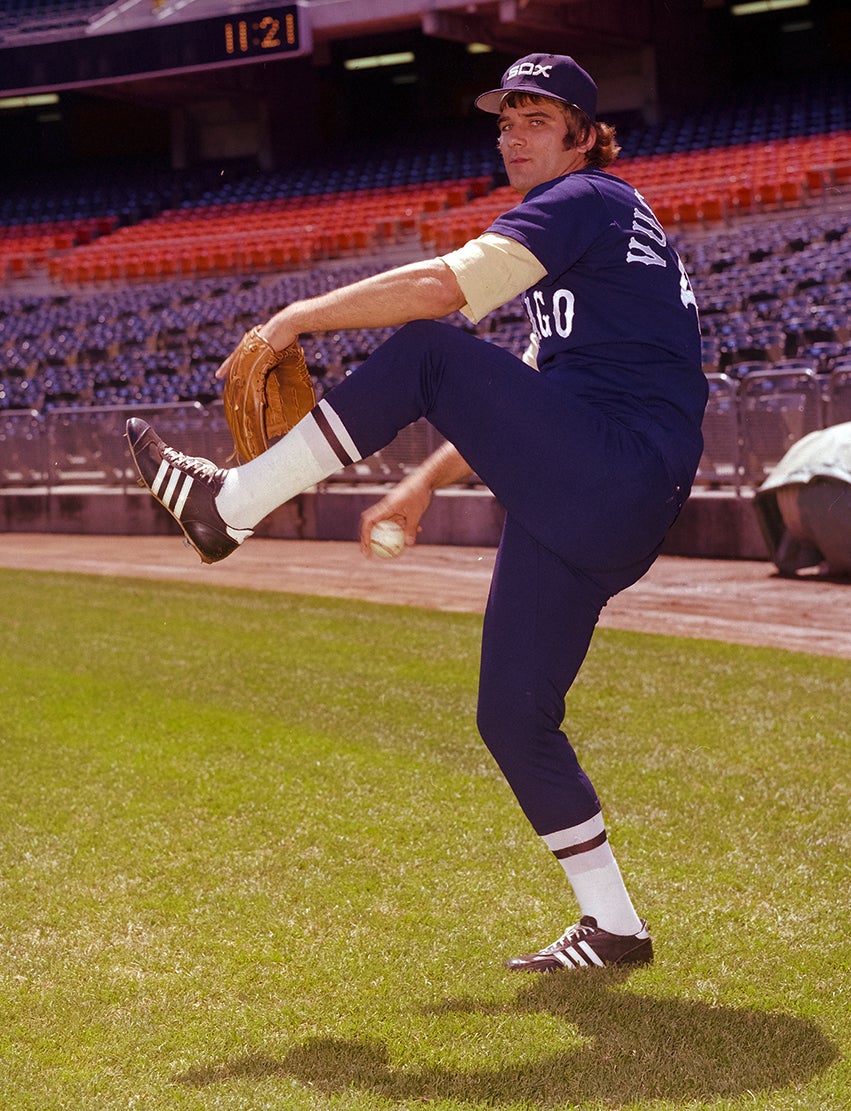
Vuckovich began the 1975 season with Triple-A Denver, going 11-4 with a 4.34 ERA in 19 games sandwiched around two stints with the White Sox. He made his big league debut on Aug. 3 and gave up seven runs in 2.1 innings against the Twins, made another start against the Angels on Aug. 7 and then returned to the minors before being called up when rosters expanded in September.
Over four appearances with Chicago that year, Vuckovich posted a 13.06 ERA. But his physical and mental makeup convinced the White Sox that he had a big league future.
Vuckovich made the White Sox’s Opening Day roster in 1976 as a member of the bullpen and went 7-4 with a 4.65 ERA over 110.1 innings. Only three Chicago pitchers had more wins that year in a season where the White Sox lost 97 games.
Following the season, the White Sox left Vuckovich available in the Expansion Draft, and the Blue Jays selected him with the 18th overall selection.
“I was ticked off when the White Sox let me go,” Vuckovich told the Chicago Tribune after picking up a save for the Blue Jays in their first-ever game – a 9-5 win over the White Sox on April 7, 1977. “They invested money in me, and they didn’t protect me (in the draft). They didn’t think I was ready.”
Vuckovich pitched well for the Blue Jays in 1977, going 7-7 with eight saves in 53 games, including eight starts. He struck out 123 batters over 148 innings and walked only 59.
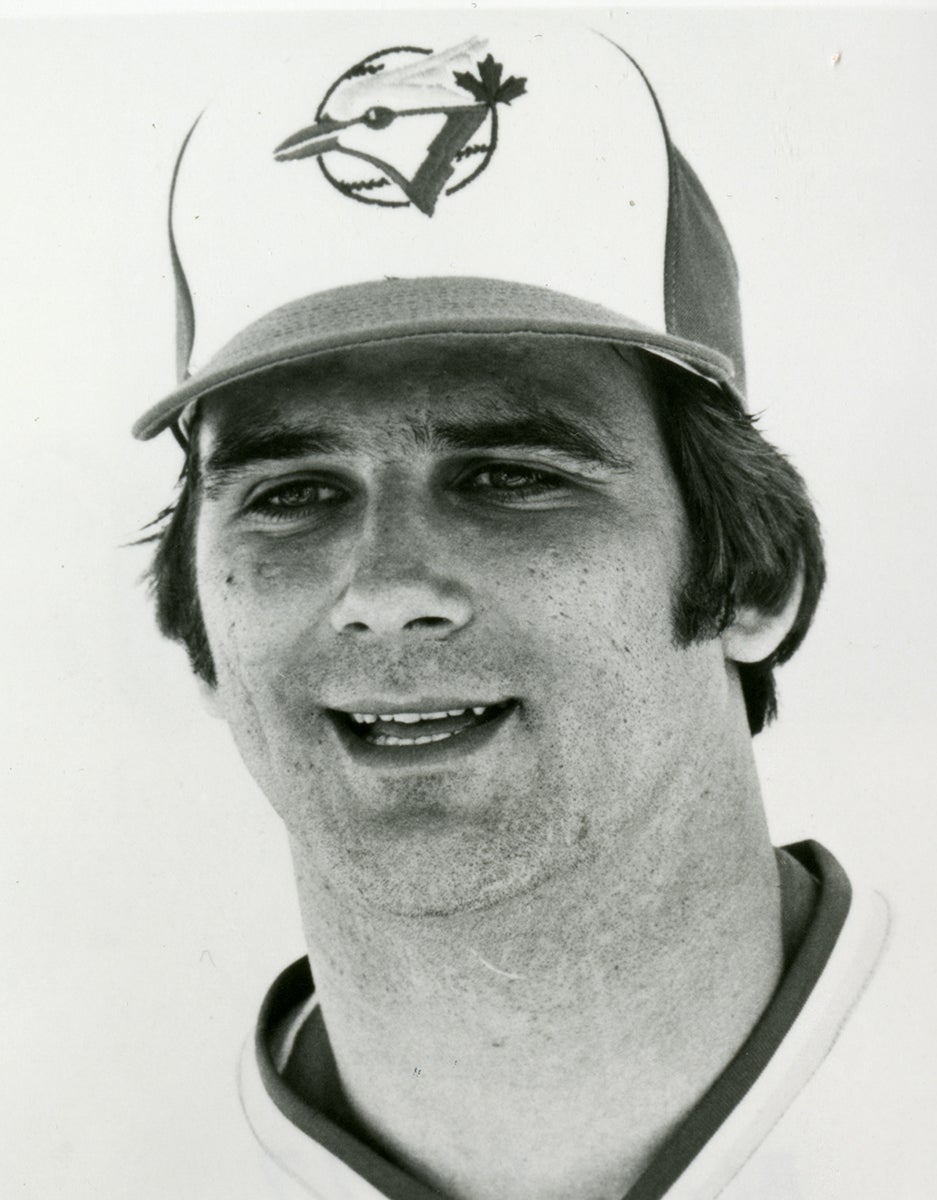
But with the Blue Jays looking to add as many quality players as possible, Toronto traded Vuckovich and outfielder John Scott to the Cardinals following the season in exchange for pitchers Victor Cruz and Tom Underwood.
“I asked to be traded,” Vuckovich told the Post-Dispatch in the spring of 1978.
The Cardinals were more than happy to acquire Vuckovich.
“We made this deal,” Cardinals general manager Bing Devine told the Associated Press, “because we need help right now.”
Vuckovich did not disappoint Devine, going 12-12 with a 2.54 ERA – the third-best mark in the National League and just .11 points short of leader Craig Swan of the Mets – over 198.1 innings, working both as a starter and out of the bullpen. In 1979, Vuckovich became a fulltime starter and went 15-10 with a 3.59 ERA in 233 innings.
Vuckovich was the Cardinals' Opening Day starter in 1980 and pitched a three-hit shutout against the defending World Series champion Pirates, fanning Tim Foli, Dave Parker and Willie Stargell with runners on second and third and no one out in the ninth inning to wrap up a 1-0 St. Louis win.
The performance earned Vuckovich high praise from Cardinals legend Stan Musial.
“This was amazing,” Musial told the Post-Dispatch. “(Vuckovich) won’t give up and throws the best right-handed breaking pitches I ever saw.”
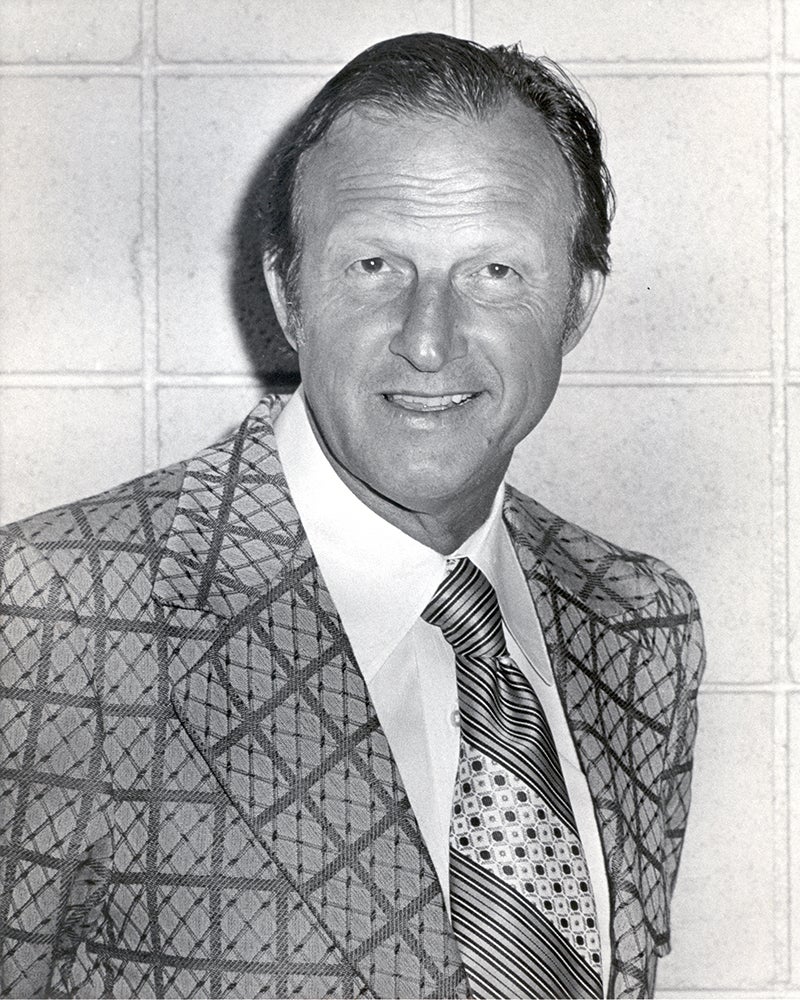
Vuckovich continued to pitch well all season and finished with a 12-9 record and 3.40 ERA over 222.1 innings, including three shutouts. But the Cardinals stumbled to an 18-33 record out of the gate before manager Ken Boyer was replaced by Whitey Herzog, who spent the rest of the season evaluating the team.
On Dec. 12, 1980, Herzog – also serving as general manager – traded Vuckovich, Ted Simmons and newly acquired Rollie Fingers to the Brewers in exchange for David Green, Dave LaPoint, Sixto Lezcano and Lary Sorensen. The deal sent two future Hall of Famers and a soon-to-be Cy Young Award winner to Milwaukee but also retooled the Cardinals into the team Herzog wanted.
Brewers general manager Harry Dalton told the Associated Press that the trade gave his team “the best balance we’ve had in the three years I’ve been here.”
Vuckovich, who was slated to become a free agent after the 1981 season, was philosophical about the trade.
“This is my fourth team and my fifth general manager,” Vuckovich told the Wisconsin State Journal. “I want security. I want someone to show me the money. I will show them great baseball and will try my damnedest.”
Ten days before the start of the 1981 season, Vuckovich and the Brewers agreed to a multi-year deal that reportedly paid him about $600,000 per year.
Vuckovich started the Brewers’ third game of the season and struggled in the first month before returning to his previous form. He went 14-4 in that strike-shortened season, tying for the MLB lead in victories and helping Milwaukee advance to the postseason for the first time. Six of his wins were saved by Fingers, who won the AL Cy Young Award and AL MVP Award that season.
Vuckovich started Game 4 of the ALDS vs. the Yankees – while battling tonsilitis and a fever – and allowed only one unearned run over five innings in a 2-1 Milwaukee victory that pushed the series to a decisive Game 5. But New York won that game 7-3 to advance to the ALCS, with Vuckovich coming on in the bottom of the eighth to squelch a Yankees rally that had already increased New York’s lead to four runs.
“I felt well but I had trouble focusing a little bit and my eyes were watering,” Vuckovich told the AP after his Game 4 start. “I threw up a few times in the (bathroom) behind the dugout but I kept going out there and tried to get the hitters out.”
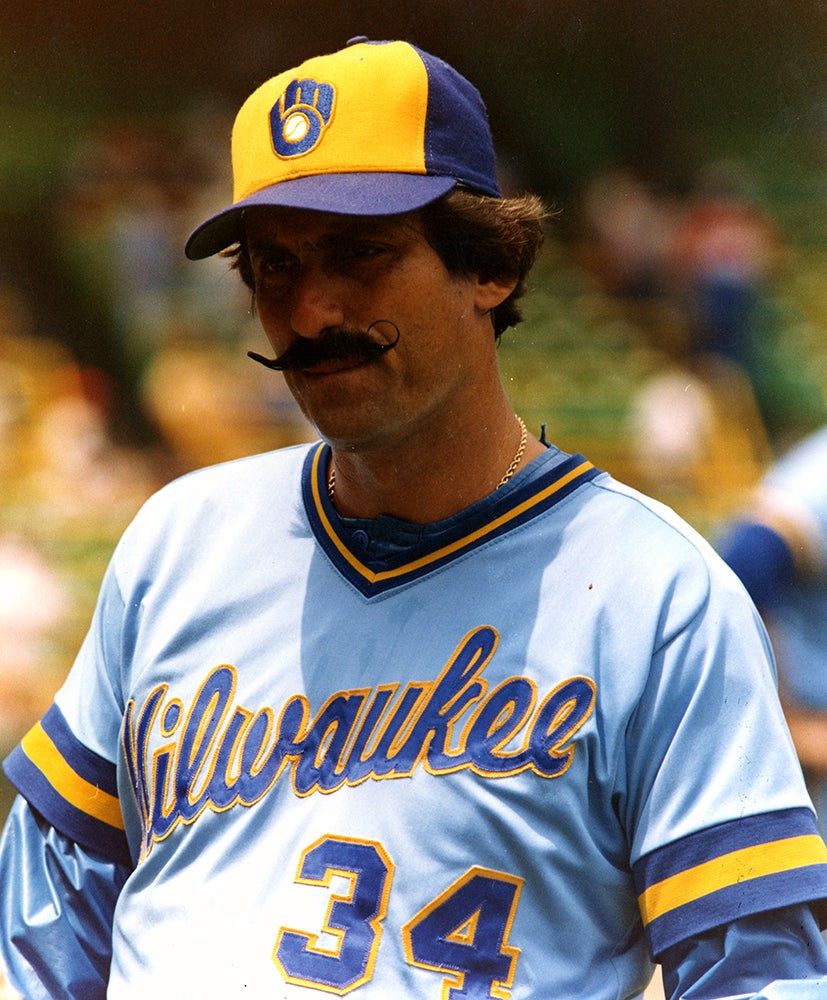
Vuckovich finished fourth in the AL Cy Young voting following the season and drew the start on Opening Day 1982 as Milwaukee headed into a season filled with high expectations. In a harbinger of things to come, the Brewers beat the Blue Jays 15-4 in the opener as Vuckovich benefited from Milwaukee’s outstanding offense.
Vuckovich had a 10-4 record at the All-Star break and continued to rack up victories as the Brewers battled the Orioles for the AL East title. Needing just one win to wrap up a postseason berth, Vuckovich and the Brewers lost to Baltimore in the first game of a doubleheader on Oct. 1 and then dropped the nightcap 7-1. An 11-3 Baltimore win on Saturday, Oct. 1, left the teams tied at 94-67 heading into the final game – but Don Sutton pitched Milwaukee to a 10-2 win in the finale to clinch the title, a game where Jim Palmer gave up four runs (three earned) over five innings while being charged with the loss.
That game might have decided the AL Cy Young vote, as Vuckovich outpointed Palmer 87-59 when the totals were announced – leaving Palmer just short of his fourth Cy Young Award.
Vuckovich finished the season 18-6 with a 3.34 ERA and started two games in the ALCS vs. the Angels. He was charged with four runs over eight innings in a 4-2 loss in Game 2 then allowed three runs over 6.1 innings in Game 5. Vuckovich left that game trailing 3-2 but Milwaukee rallied on a two-run single by Cecil Cooper in the seventh inning to win 4-3 and advance to the World Series.
Vuckovich started Game 3 of the Fall Classic against the Cardinals in a matchup that was greatly shaped by the deal two years earlier that sent Vuckovich to Milwaukee. He allowed six runs (four earned) over 8.2 innings, surrendering two home runs to St. Louis’ Willie McGee – who also went over the County Stadium fence to rob the Brewers of two home runs in a 6-2 Cardinals win.
“He can him ’em,” Vuckovich told the AP about McGee, “and he can take ’em away.”
Vuckovich drew the Game 7 start in a series that went the distance, this time leading 3-1 entering the bottom of the sixth before allowing a one-out single to Ozzie Smith and a follow-up double to Lonnie Smith. With runners on second and third, Brewers manager Harvey Kuenn brought in reliever Bob McClure, who walked Gene Tenace to load the bases before allowing a game-tying single by Keith Hernandez and a go-ahead single by George Hendrick. Vuckovich ended up with a no-decision in a game St. Louis won 6-3 to capture the title.
Vuckovich allowed 10 hits and two walks in his 5.1 innings but was unfazed by all the traffic on the bases.
“I try to make the perfect pitch every time I release the ball,” Vuckovich told the Boston Globe in the spring of 1983. “That’s why I walk so many and throw so many pitches. I’m not afraid of being behind or having a couple runners on base. I think in terms of winning, rather than not losing.”
But all those pitches began to take a toll on his shoulder, and in the spring of 1983 Vuckovich was diagnosed with a torn rotator cuff. He returned to action for three games at the end of the season – choosing to rehab the shoulder as opposed to surgery – but lost velocity off his fastball.
Facing more pain in the spring of 1984, Vuckovich underwent surgery and missed the entire season.
In 1985, Vuckovich returned to the Brewers rotation and started the team’s fourth game of the year. But after a couple effective outings, it was clear that Vuckovich’s skills had been compromised by the injury. He appeared in 22 games that year, going 6-10 with a 5.51 ERA in 112.1 innings. He underwent shoulder surgery again following the season.
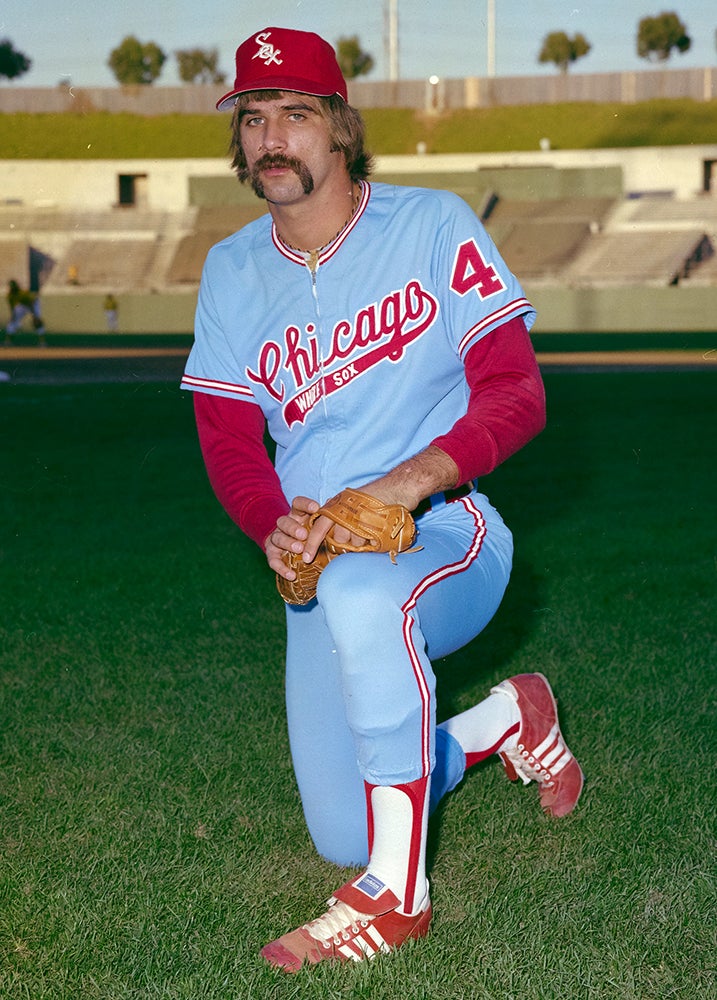
After a few rough Spring Training outings, Vuckovich announced his retirement on March 29, 1986. But he returned five months later on a minor league deal and appeared in six games for the Brewers’ Triple-A affiliate in Vancouver, going 2-1 with a 1.26 ERA. Recalled to the big leagues in September, Vuckovich started six games, going 2-4 with a 3.06 ERA.
“Pain is a state of mind,” Vuckovich told the Associated Press while with Vancouver. “I try to block that from my thoughts. All in all, I feel very well. It’s clicking. I don’t need to throw 90 mph to win.”
But when the Brewers released Vuckovich on Oct. 21, 1986, his career officially ended – at least away from the silver screen. In 1988, Vuckovich signed on to play the part of Clu Haywood in the film Major League, which was released in 1989 and became a smash hit. Fresh of that success, he joined the Brewers’ broadcast team in 1989 and spent three years in the booth.
Vuckovich returned to baseball in 1997 as the Pirates big league pitching coach, holding that job for four seasons under manager Gene Lamont. He later worked as an assistant general manager for both the Pirates and the Mariners.
Over 11 big league seasons, Vuckovich was 93-69 with a 3.66 ERA over 1,455.1 innings. And while unquestionably one of the game’s best pitchers for a period of time, he also remained true to himself while in the glare of the game’s brightest lights.
“I like to be me,” Vuckovich told the Wisconsin State Journal in 1981. “I live one day at a time. If I wake up in the morning, I have a chance. If I don’t wake up, it doesn’t really matter.
“I don’t think there is any room in life for sorrow and pain and hurt. That doesn’t add to the fun of life.”
Craig Muder is the director of communications for the National Baseball Hall of Fame and Museum
RELATED STORIES

#CardCorner: 1976 Topps Sixto Lezcano

#CardCorner: 1981 Topps Moose Haas
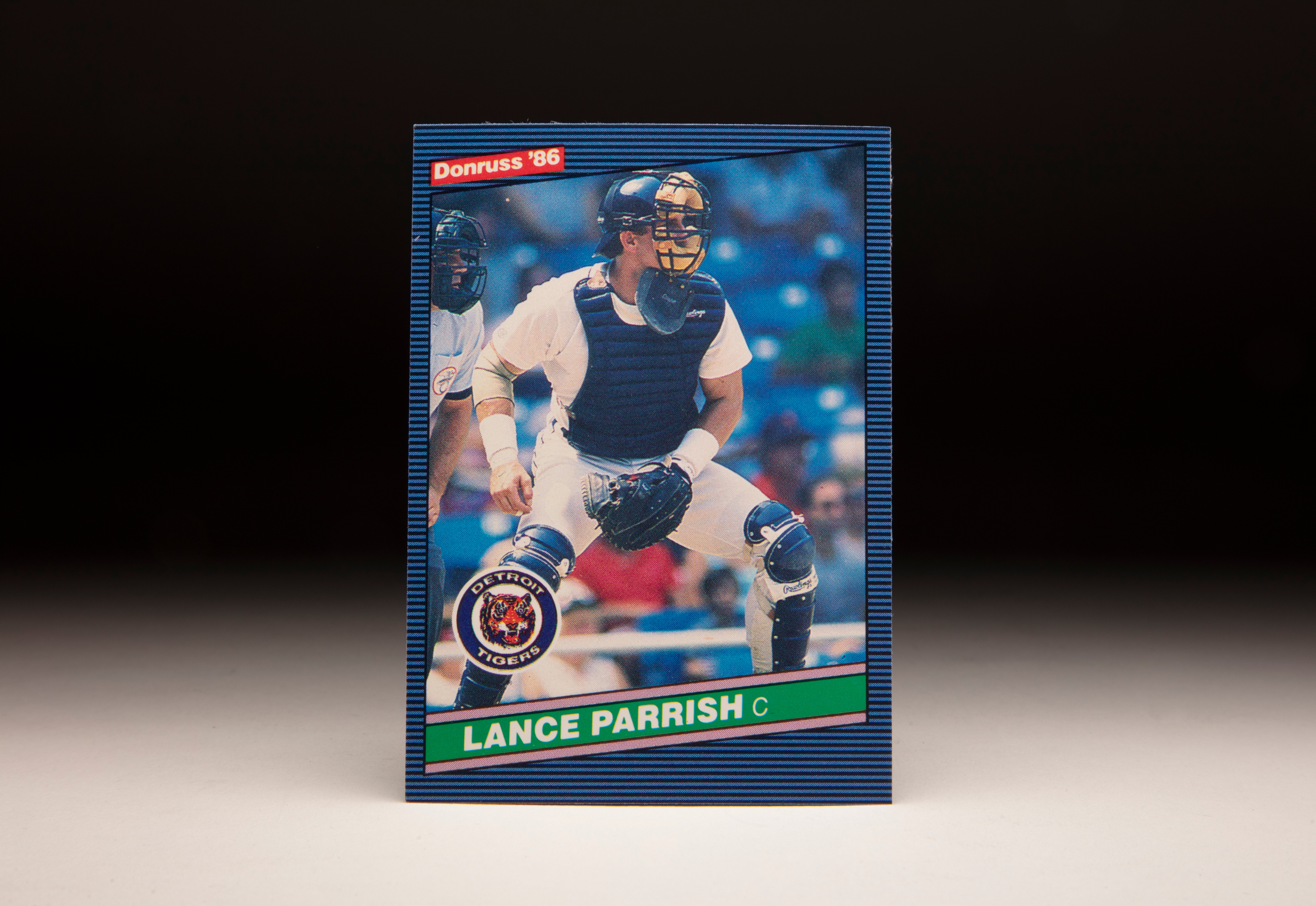
#CardCorner: 1986 Donruss Lance Parrish
RELATED STORIES

#CardCorner: 1976 Topps Sixto Lezcano

#CardCorner: 1981 Topps Moose Haas


